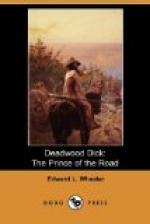But the road-agents only pause a moment in their song to send back a wild, sarcastic laugh; then they resume it, and merrily dash along up the gulch, the ringing of iron-shod hoofs beating a strange tatoo to the sound of the music.
Sleepily the miners crawl back to their respective couches; the moon smiles down on mother earth, and nature once more fans itself to sleep with the breath of a fragrant breeze.
* * * * *
Deadwood—magic city of the West!
Not dead, nor even sleeping, is this headquarters of the Black Hills population at midnight, twenty-four hours subsequent to the rush of the daring road-agents through Camp Crook.
Deadwood is just as lively and hilarious a place during the interval between sunset and sunrise as during the day. Saloons, dance-houses, and gambling dens keep open all night, and stores do not close until a late hour. At one, two and three o’clock in the morning the streets present as lively an appearance as at any period earlier in the evening. Fighting, shooting, stabbing and hideous swearing are features of the night; singing, drinking, dancing and gambling another.
Nightly the majority of the miners come in from such claims as are within a radius of from six to ten miles, and seldom is it that they go away without their “load.” To be sure, there are some men in Deadwood who do not drink, but they are so few and scattering as to seem almost entirely a nonentity.
It was midnight, and Deadwood lay basking in a flood of mellow moonlight that cast long shadows from the pine forest on the peaks, and glinted upon the rapid, muddy waters of Whitewood creek, which rumbles noisily by the infant metropolis on its wild journey toward the south.
All the saloons and dance-houses are in full blast; shouts and maudlin yells rend the air. In front of one insignificant board, “ten-by-twenty,” an old wretch is singing out lustily:
“Right this way ye cum, pilgrims, ter ther great Black Hills Thee’ter; only costs ye four bits ter go in an’ see ther tender sex, already a-kickin’ in their striped stockin’s; only four bits, recollect, ter see ther greatest show on earth, so heer’s yer straight chance!”
But, why the use of yelling? Already the shanty is packed, and judging from the thundering screeches and clapping of hands, the entertainment is such as suits the depraved tastes of the ruffianly “bums” who have paid their “four bits,” and gone in.
But look!
Madly out of Deadwood gulch, the abode of thousands of lurking shadows, dashes a horseman.
Straight through the main street of the noisy metropolis he spurs, with hat off, and hair blowing backward in a jetty cloud.
On, on, followed by the eyes of scores curious to know the meaning of his haste—on, and at last he halts in front of a large board shanty, over whose doorway is the illuminated canvas sign: “Metropolitan Saloon, by Tom Young.”




